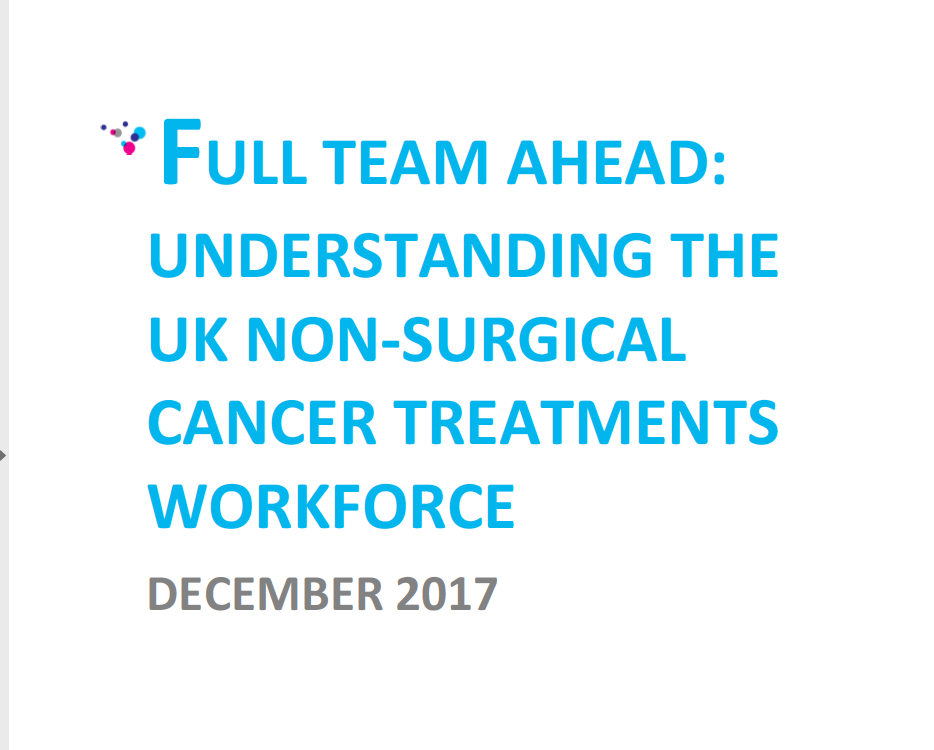The non-surgical oncology workforce has been growing in recent years but not fast enough to match the demand for treatment, according to a new study by Cancer Research UK.
The numbers of therapeutic radiographers and medical and clinical oncologists have grown by almost 4% on average in the past three years, but the incidence of cancer has gone up by 8% a year.
Full Team Ahead: Understanding the UK Non-Surgical Cancer Treatments Workforce, includes a survey of workforce data, interviews with staff and advice from a range of health professionals. Almost 3 out of 4 respondents say that staff shortages are "a barrier to providing efficient cancer treatments and excellent patient experience."
The SCoR, along with the Royal College of Radiologists, the Instititue of Physics and Engineering in Medicine, the Association of Cancer Physicians, the UK Oncology Nursing Society and other organisations contributed to and supported the report's findings.
The CR-UK survey found that the effect of shortages results in:
- Lack of capacity by staff to carry out clinical research
- Low levels of patient experience - 43% of staff say they do not have enough patient-facing time to deliver best practice care
- Lack of time to carry out service improvements - what time staff have is focussed on patient care
- Less frequent sharing of best practice
- Lack of future planning - constantly looking to resolve short term issues and minimal long-term strategic thinking
- Workforce skills and experience not being used effectively - lack of admin support staff means that members of the clinical professionals time is used inappropriately
- Staff wellbeing and morale are low - all groups questioned said they are consistently working more than their contracted hours
The report has generated a range of recommendations to address the issues raised including:
- Workforce numbers should be based on patient demand, not affordability.
- Staff shortages should be reported on the basis of the staff needed to meet patient demand, not vacancy figures.
- More training places are needed.
- Reviewing the effect that the removal of student bursaries is having.
- Examining the impact of future cancer treatments on the numbers of staff and the skills required.
- Training more advanced clinical practitioners.
- Increasing non-medical prescribing.
- Non-medical professionals taking on treatment reviews, radiotherapy treatment planning and plan checking.
In a section of the report that examines the benefits of greater skills mix, it is noted that "more therapeutic radiographers would enable more clinical research in radiotherapy and better implementation of complex treatment techniques."
Charlotte Beardmore, the SCoR's director of professional policy, said, "This is an important and detailed report highlighting the workforce challenges in the treatment of cancer. The Society has been pleased to be engaged in this multiprofessional work led by CR-UK.
"The report acknowledges that investment is required across all cancer workforce groups in order to ensure that the UK is able to deliver the best treatment outcomes for patients."
Spencer Goodman, the Society's professional officer for radiotherapy, cancer care and workforce planning issues, added, "The report also importantly highlights that skills mix and development of advanced clinical practice within teams, will be essential in supporting timely high quality and evidence based delivery of diagnosis and cancer treatment for patients."
Charlotte continued, "We understand the research and conclusions have been shared with Health Education England to help inform the development of the cancer workforce strategy. We await the publication of the strategy to see how the recommendations within the CR-UK report will be addressed."
Download the executive summary and full version of Full Team Ahead: Understanding the UK Non-Surgical Cancer Treatments Workforce.
